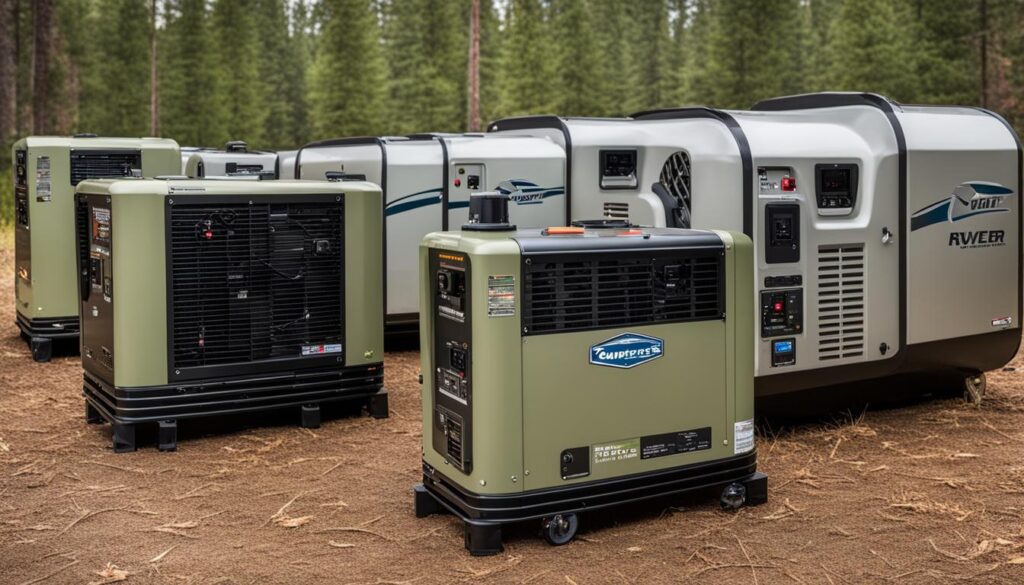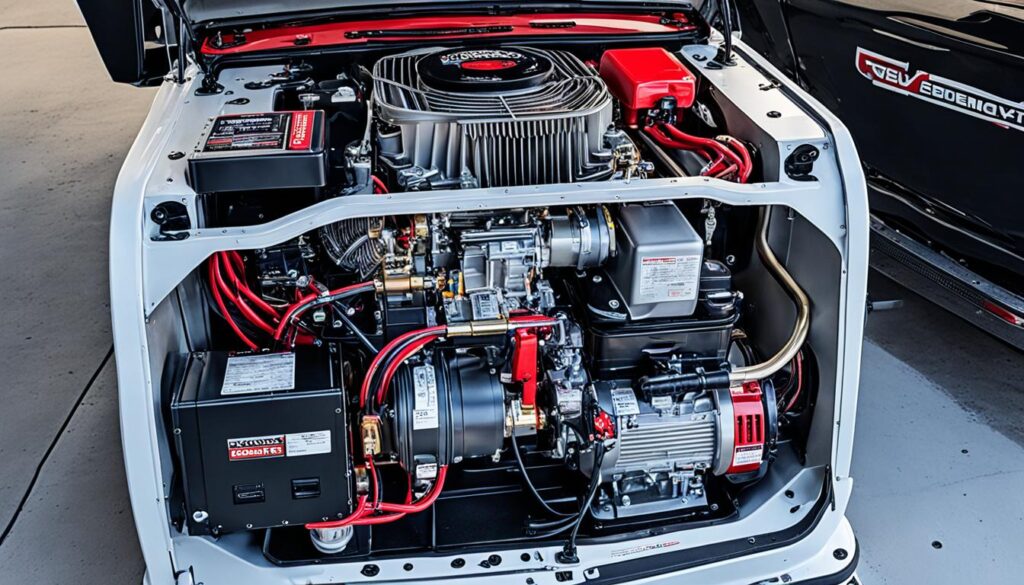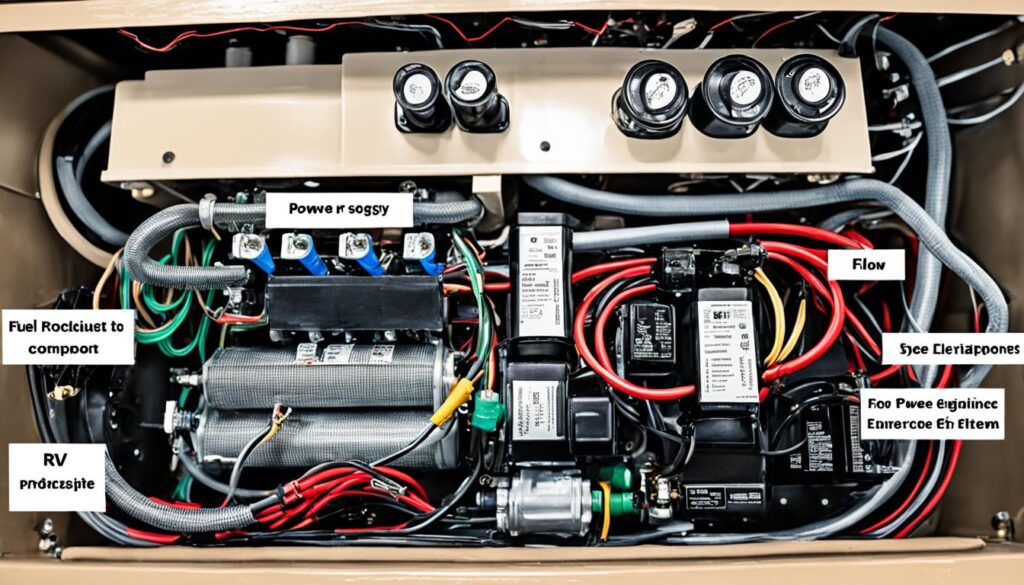RV generators are like the beating heart of the great outdoors, providing the much-needed power to keep our adventure-filled RV trips running smoothly. But have you ever wondered how these powerful machines actually work? How do they convert fuel into electricity to keep our appliances, electronics, and air conditioning running?
In this article, we will dive deep into the mechanics of RV generators, exploring their operation and shedding light on the key components that make them tick. Whether you’re a seasoned RVer or new to the world of recreational vehicles, understanding how RV generators work is crucial for optimizing their performance and ensuring a comfortable and convenient camping experience.
So, let’s embark on this journey through the inner workings of RV generators, unraveling their secrets and demystifying their magic. Are you ready?
Key Takeaways:
- RV generators are essential for powering appliances, electronics, and air conditioning in RVs during camping trips.
- RV generators convert fuel into electricity, providing a reliable power source when camping off-grid or in areas without electrical hookups.
- Understanding the operation and mechanics of RV generators is crucial for selecting the right generator size, optimizing power usage, and ensuring a comfortable camping experience.
- There are built-in and portable RV generators, each with their own advantages and considerations.
- Factors such as power requirements, fuel source, noise level, and maintenance should be taken into account when choosing an RV generator.
Contents
RV Generator Options and Sizes
RV generators come in various sizes and options to meet different power needs. When choosing an RV generator, it’s important to consider the functions, technology, and components that best suit your requirements.
One important consideration is the generator’s wattage. A 2,000- to 2,500-watt generator is suitable for charging electronics, TVs, and small kitchen appliances. However, if you have larger power needs, such as running air conditioning units or powering larger RVs, you’ll need a higher wattage generator.
To determine the right generator size for your RV, it’s essential to evaluate the power requirements of all your appliances and electronics. This will ensure that you choose a generator that can handle the load without overloading the system.
In addition to wattage, RV generators can vary in terms of technology and features. Some generators are designed for quiet operation, making them ideal for camping in noise-sensitive areas. Others prioritize fuel efficiency, allowing you to maximize your power usage and minimize fuel consumption.
Advanced features such as automatic shut-off sensors and remote starters offer convenience and ease of use. These technologies allow you to control and monitor your RV generator from a distance, ensuring reliable and hassle-free power supply.
When it comes to cost, RV generators can range from $300 to $1,500, depending on the wattage and additional features. It’s important to assess your budget and prioritize the features that are most important to you.
Overall, understanding the functions, technology, and components of RV generators will enable you to make an informed decision that aligns with your power needs and preferences.
RV Generator Options and Sizes
| Generator Size | Suggested Uses |
|---|---|
| 2,000-2,500 watts | Charging electronics, TVs, small kitchen appliances |
| 3,000-4,000 watts | Running air conditioning units, larger RVs |
| 4,500-6,000 watts | Powering multiple appliances and electronics simultaneously |

“Choosing the right generator size is crucial to ensure that you have enough power to meet your RV’s needs without overloading the system.”
Considering the functions, technology, and components of RV generators will help you select the right option that meets your power needs and provides a reliable source of energy during your camping adventures.
Types of RV Generators: Built-In and Portable
When it comes to RV generators, there are two main types to choose from: built-in and portable generators. Each type offers its own set of advantages and considerations for RV owners.
Built-In Generators
Built-in generators are permanently installed in the RV and are typically hardwired to the electrical system. They are designed to start with the push of a button and use the RV’s own fuel source. This type of generator offers convenience and ease of use, as there is no need to carry a separate generator or fuel tank. Built-in generators are also more powerful, making them suitable for running multiple appliances and systems in larger RVs.
Portable Generators
On the other hand, portable generators are separate units that can be easily moved and placed outside the RV. They are started manually and require a separate fuel tank. Portable generators offer more flexibility and versatility, as they can be used not only for RVs but also for other outdoor activities or emergencies. They can be stored away when not in use, and their portability allows for easy transportation. However, portable generators are generally less powerful than built-in generators, so they may not be able to run as many appliances simultaneously.
Regardless of whether you choose a built-in or portable generator, both types work on the same principle: using fuel to generate electricity. The electricity produced can either be stored in the RV’s battery or used directly through plug-ins to power appliances and systems.
To give you a clearer understanding of the differences between built-in and portable generators, refer to the table below:
| Types of RV Generators | Advantages | Considerations |
|---|---|---|
| Built-In Generators |
|
|
| Portable Generators |
|
|
Now that you have a better understanding of the different types of RV generators, you can weigh the advantages and considerations to determine which option best suits your needs and preferences. Whether you prioritize convenience and power or value mobility and versatility, there is an RV generator that will meet your requirements.

Factors to Consider When Choosing an RV Generator
When selecting an RV generator, several factors need to be considered. The size of the generator should match the power needs of the RV, taking into account the wattage requirements of all appliances and electronics. It’s crucial to ensure that the generator has enough power to run all the necessary equipment without overloading.
The fuel source is another important consideration. RV generators can be powered by gasoline, diesel, or propane. Each fuel type has its advantages and disadvantages. Gasoline is readily available but may have storage limitations and emit more pollutants. Diesel is more fuel-efficient but can be more expensive and may require additional maintenance. Propane is clean-burning and has a longer shelf life, but it can be less accessible in some areas.
Noise level is also an essential factor to consider, especially when camping in close quarters or in parks with noise restrictions. Many RVers prefer quiet generators to minimize disruptions for themselves and neighboring campers. Some generators are specifically designed to operate quietly, making them suitable for RV use.
Price and brand should also be taken into account. It is important to find a generator that offers the best value for your budget while considering the reliability and reputation of the manufacturer. Additionally, fuel efficiency is an important factor to consider, as it can impact long-term operating costs and the frequency of refueling.
Regular maintenance is crucial for ensuring the optimal performance and longevity of an RV generator. This includes routine checks, oil changes, and filter replacements. Troubleshooting is also important in identifying and resolving any issues that may arise. Following the manufacturer’s recommended maintenance schedule and troubleshooting guide can help prevent costly repairs and ensure that the generator operates efficiently.
| Factor | Considerations |
|---|---|
| Size | Match the generator size to the power needs of the RV by considering the wattage requirements of all appliances and electronics. |
| Fuel Source | Choose between gasoline, diesel, or propane based on availability, storage capabilities, and emissions. |
| Noise Level | Select a generator with quiet operation to minimize noise disruptions while camping. |
| Price and Brand | Consider the cost and reputation of the manufacturer when choosing an RV generator. |
| Fuel Efficiency | Opt for a generator that offers fuel efficiency to reduce operating costs and the frequency of refueling. |
| Regular Maintenance | Follow the manufacturer’s recommended maintenance schedule to ensure optimal performance. |
| Troubleshooting | Refer to the generator’s troubleshooting guide to identify and resolve any issues that may arise. |
Top RV Generator Recommendations
When it comes to choosing an RV generator, there are several options that are highly recommended by RVers. These generators are known for their advanced technology, reliable components, and ease of maintenance. Whether you prioritize fuel efficiency, portability, or budget-friendliness, there is a generator on the market that will meet your needs.
The Honda EU2200i is a popular choice among RV enthusiasts due to its quiet operation and exceptional fuel efficiency. It is designed to provide reliable power while minimizing noise, making it a great option for those who value peace and quiet at the campground.
If lightweight portability is important to you, the Yamaha EF2000iSv2 is a top contender. This generator is compact, easy to transport, and perfect for those who are always on the move. Despite its small size, it still delivers reliable power to keep your RV running smoothly.
For those who need a good balance between power and portability, the Generac GP3000i is an excellent choice. It offers enough power to run essential appliances and electronics while still being lightweight and easy to maneuver. Its durable components ensure longevity and reliability.
On a tighter budget? The WEN 56203i is a budget-friendly option that doesn’t sacrifice quality. With a larger fuel tank compared to similar generators in its price range, it provides longer runtime and fewer interruptions. It’s a great value for RVers looking to maximize their investment.
If you’re seeking a versatile generator with advanced features, the Predator 3500 is a top contender. This generator offers remote start capability for added convenience, along with a range of other features that cater to the needs of RVers. Its technology ensures smooth operation and allows for easy troubleshooting if any issues arise.
When selecting an RV generator, it’s important to consider your specific power requirements, read reviews, and choose a generator that aligns with your needs and preferences. Regular maintenance and troubleshooting will help maintain the longevity and reliability of your RV generator. With the right generator, you can enjoy all the comforts of RV living while being confident in your power source.
FAQ
How do RV generators work?
RV generators work by using fuel, such as gasoline or propane, to generate electricity. This electricity can be stored in the RV’s battery or used directly through plug-ins to power appliances and electronics.
What are the main types of RV generators?
The main types of RV generators are built-in and portable. Built-in generators are permanently installed in the RV and are hardwired to the electrical system, while portable generators are separate units that can be moved and placed outside the RV.
What factors should I consider when choosing an RV generator?
When choosing an RV generator, factors to consider include the generator’s size and power output, the fuel source (gasoline, diesel, or propane), noise level, price, brand, and fuel efficiency.
How do I maintain and troubleshoot an RV generator?
Regular maintenance is essential for optimal performance. This includes checking oil levels, cleaning or replacing air filters, and inspecting spark plugs. Troubleshooting may involve checking fuel supply, verifying electrical connections, and resetting circuit breakers.
What are some recommended RV generator options?
Popular RV generator options include the Honda EU2200i, Yamaha EF2000iSv2, Generac GP3000i, WEN 56203i, and Predator 3500. These generators offer various features such as quiet operation, fuel efficiency, portability, and advanced functions.






